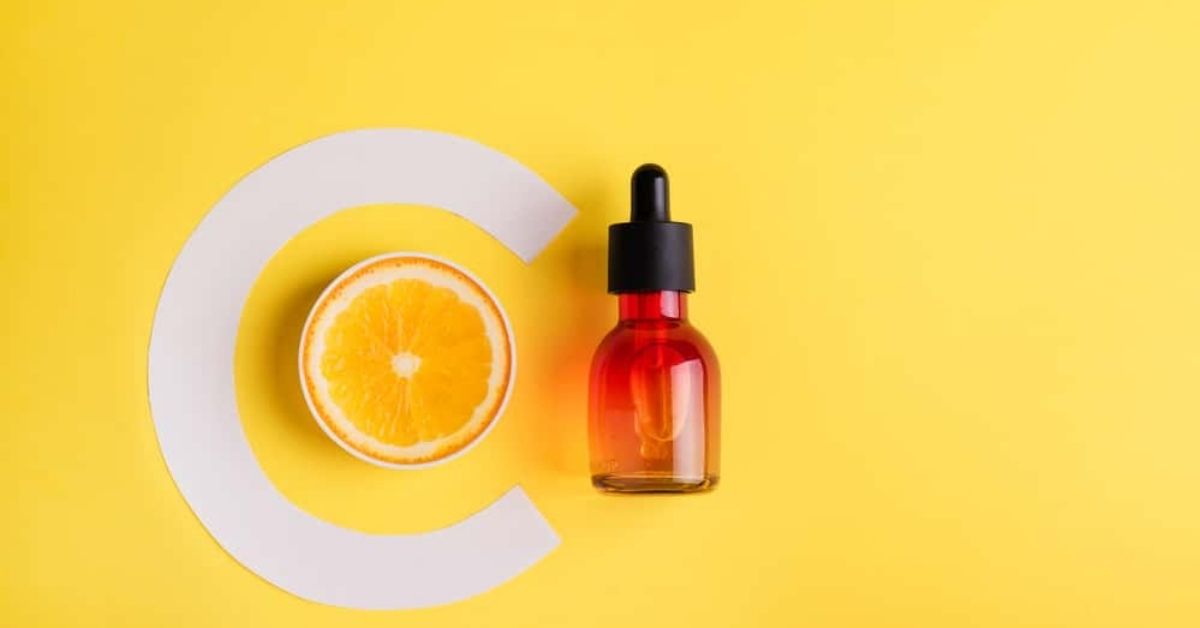Wondering how to make your very own DIY vitamin C serum at home? You are at the right place.
In this post, you will learn how to make vitamin C serum at home from orange peel.
I am very skeptical about using expensive skin care products on my face these days.
I enjoy the process of preparing my own products at home with all-natural ingredients.
It’s a very relaxing experience for me.
A month ago, I was looking for a solution that would not only get rid of all the excess oil but also improve my skin texture.
That is when I stumbled upon this amazing vitamin c serum recipe for wrinkles and age spots using orange peel.
After over 1 month of using this orange vitamin C serum in my skincare routine, I feel confident sharing this recipe with you guys.
My skin feels softer and the overall appearance of my skin has drastically improved after using it.
Let’s see why this 5-minute serum recipe actually works…
Why Use Vitamin C For Your Face?
C has some amazing benefits for the –
- It has antioxidant properties that promote glowing and repairs it as well.
- It is safe for almost all types.
- It is hydrating.
- It reduces redness and evens out your .
- It helps fade .
- It reduces the appearance of under-eye circles.
- It helps promote by removing .
- It helps in anti-aging by reducing the appearance of and .
- It protects you against by fighting and soothes sunburns from excessive .
What’s Wrong With The StoreBought ?
You can buy a face at almost any department store.
There are so many brands, all claiming to do the same thing. Some are quite affordable as well.
But here’s what they are not telling you.
- C has a short shelf life. It can quickly oxidize and change its color and appearance. This renders the product completely useless.
- The pipet applicators used in Vitamin C serums also allow for a lot of air exposure.
- Also, there are so many forms of C serums available in the market, so it is very tough to choose a decent one. Most serums contain , which is highly acidic in nature and can irritate .
Here’s a detailed article listing the various pros and cons of commercial C serums.
This orange that we are going to prepare today will definitely improve the quality of your .
As you will see, it is also super affordable to make at home.
It is good for all types too. On top of all, it smells good too.
Related Read: With Tablets
Let’s dive right in and learn how to make our own homemade .
1. Take a couple of oranges and, grate their outer cover.
2. Make sure you are only grating the orange till it is orange in color. Do not grate the white part of the orange for this DIY recipe.
3. Add one cup of water to it. Put this mixture for boiling at a high temperature on a gas stove.
4. When the mixture starts boiling, reduce the flame to a medium-low. Leave the mixture for 10-12 minutes.
5. The mixture will now get concentrated and all the C juice from the oranges will get dissolved in water.
6. At this point, strain the C juice into a bowl. Make sure you squeeze out all the juice from this mixture.
7. Take 1 tablespoon of Organic Aloe Vera Gel and add it to the C juice we made in the 1st step. Mix well till all lumps disappear. It is available on Amazon as well as any medical store.
8. Take any Vitamin E capsules available in the market. If you have , add one drop from the capsule. If you have normal/, you can add 2-4 drops of as well.
9. If you feel that the mixture is still very thin, you can add more Aloe Vera Gel or glycerin into the mixture accordingly.
You can store this for 1 month, but I suggest you consume one batch within 10 days and make a fresh one after that.
Your homemade for glowing , using natural ingredients, is now ready to use.
Wasn’t this easy? It doesn’t require much time and is not taxing on the wallet too.
I absolutely love it.
- Select a small area of .
- Apply a small amount of the and wait for 24 hours.
- If no side effects occur, go ahead and apply it to your face. Do not use if you develop a rash, redness, or hives.
- You can follow it up with your favorite .
- Use it consistently for at least 3 months to see the best results.
Here are some of the benefits of using this orange serum for face –
- All the ingredients are easy to get and inexpensive.
- It takes merely 5 minutes to prepare this .
- It protects your from the harmful radiation of the sun.
- It helps heal conditions like acne, blemishes, , dryness, etc.
- It promotes .
- It’s safe to use this all over your face, as it has all-natural ingredients.
Frequently Asked Questions
Yes. Take some orange peels and dry them by baking or microwaving them, then grind them up. You can use the powder in food or for drinks. A teaspoon of this powder is as good as a tablet of vitamin C!
Yes, but it must be stored in an airtight container and is best used within a month, which might limit its usefulness.
Yes, you can! There are many vitamin C serums on the market, but it’s still important that you contact your doctor and get a professional opinion. Vitamins are usually used in high doses to help fight various diseases internally, and applying them to skin-related issues is completely different. The serum could irritate your skin or be too harsh for your type of issue if not recommended by a professional first.
Yes. The active vitamin C ingredient in many skincare products is L-ascorbic acid, which tends to neutralize free radicals and promote collagen production.
Topically applied vitamin C is used as an ingredient in many skin-whitening and coloration creams aimed at improving the appearance of uneven skin tone, sun spots, age spots, and other issues.
Yes, too much vitamin C can turn your skin orange. While high doses of vitamin C increased the production of collagen (which is important for wound healing and strengthening blood vessels), it also decreased the production of elastin (the connective tissue that helps cells stick together). And an excess amount produces a compound called hydroxyproline which oxidizes into a dye called hydroxypyrrol — which appears yellowish-brown before being metabolized by sunlight giving you an orangy appearance.
In general, you’ll want to apply a moisturizer with SPF after using Vitamin C serum. You may also want to do this if your skin starts feeling tight or dry.
Next Step? Read more tips on how to get naturally glowing skin at home.
If you liked my DIY Orange serum recipe, please don’t forget to comment below. Thanks, for reading 🙂


I love ut
I love to use homemade recipes to pamper my skin. I will definitely try this recipe. Thanks for sharing.
Can I add germall plus preservative to this serum for longer shelf life?
You can definitely use a preservative for better shelf life, but I personally add a preservative only when I am traveling and want the serum to last a little longer. Otherwise, I prefer preparing smaller batches without preservatives and finishing them off quickly.
Thank you very much for sharing
It was amazing, can you teach more DIY’s please….
Hey, thanks for liking my DIY vitamin c glow serum recipe. I have some other DIY recipes on my blog as well. I will continue posting more of these 🙂
Hello there, your vit. C homemade serum seems super easy. I am definitely going to try it this weekend. I am almost 50 years old, with very oily T zone and open pores but can’t find anything without additives and chemicals. Please do you have more DIY for aging skin? Please can we communicate by email?
Hi Odile. I have a lot of DIY recipes for oily and acne-prone skin on my blog. Unfortunately, I do not cover the topic of aging skin. There are a lot of other websites that tackle that topic well 🙂